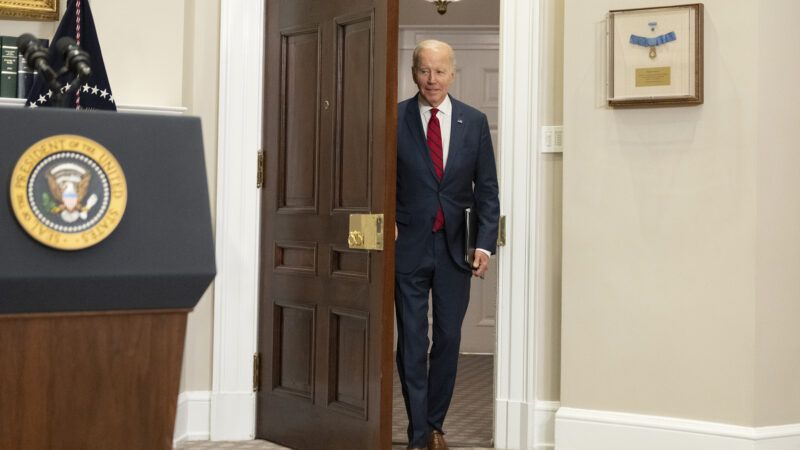If the Pandemic Is Over—And It Is—Then Biden's Emergency Powers Should End Too
But Biden can't forgive billions of dollars in student loans if the COVID-19 national emergency is over.

On Sunday, President Joe Biden made an important declaration: He conceded, at long last, that the pandemic is finally over.
He acknowledged that COVID-19 is still around and might never go away entirely; we'll still be dealing with it, in some form, for years to come. But vaccines that drastically reduce the likelihood of severe symptoms and death are available for all those who want them. We have booster shots for those who desire extra protection, like the elderly and immunocompromised, or anyone else. People who want to be extra cautious can wear KN95 masks, which scientists believe filter out the vast majority of pathogenic particles. Cumulatively, these disease prevention measures make COVID-19 a far less pressing problem. Moreover, these measures can be implemented voluntarily.
But here's a question: If the pandemic is over, as Biden admits, then why is the federal government still operating with the emergency powers granted to it during a national crisis?
According to Reuters, the public health emergency—which was declared by former President Donald Trump in early 2020—is still in effect, and the Biden administration fully intends to renew it come October. The current plan is for the Department of Health and Human Services (HHS) to let the emergency expire early next year in January 2023.
But if Biden says the pandemic is over, then the emergency authority he has claimed for himself should already have come to an end.
This matters, because Biden has used his emergency authority in very significant ways—most recently, he used it to forgive hundreds of billions of dollars in student loan debt. As Reason's Peter Suderman explained in a recent piece, Biden's loan forgiveness plan was issued under the auspices of a national emergency law.
In 2003, Congress passed the Higher Education Relief Opportunities for Students, or HEROES Act. The act "permits the Secretary of Education to waive or modify Federal student financial assistance program requirements to help students and their families or academic institutions affected by a war, other military operation, or national emergency."
The clear intention of the law was to delay or modify student loan repayment plans for Americans who were serving in combat operations—not for anyone who just happened to have student loans in the middle of the pandemic. Even House Speaker Nancy Pelosi didn't think Biden had the authority to cancel student loan debt.
"Not everybody realizes that, but the president can only postpone, delay but not forgive student loans," she said in June 2021. "It would take an act of Congress, not an executive order, to cancel student loan debt."
A few weeks ago, President Biden went ahead and canceled student loan debt anyway. His plan allows borrowers under a certain income threshold to have up to $20,000 forgiven. His plan also creates incentives for borrowers to move toward Income-Driven Repayment, or IDR, which means that instead of paying back their loans, they would pay back a percentage of their income for a decade. In most cases, this will be a far better deal for them than repaying the loan. I've previously warned that unless the government also forbids universities to raise prices, the likely outcome of this plan will be skyrocketing tuition rates because students will have more incentive to borrow heavily and the educational institutions will be wholly unconstrained in terms of what they're charging. Taxpayers are footing the bill, not the students.
In a recent report for the Brookings Institute, Senior Fellow Adam Looney found that the damage done by Biden's IDR program will essentially be catastrophic: "There are several dimensions in which it is likely to have significant, unanticipated, negative effects," he writes. These include increased rates of borrowing and the fact that "low-quality, low-value, low-earning programs" are essentially receiving a subsidy. "With regards to overall college costs," writes Looney, "institutions will have an incentive to create valueless programs and aggressively recruit students into those programs with promises they will be free under an IDR plan."
This is all very bad. And to be clear, the legal justification was dubious to begin with. But now the justification doesn't exist at all: Biden admits the national emergency has passed.
And as National Review's Charles C.W. Cooke noted in a recent piece, the Biden administration has already conceded that if it ever had such authority, that time is over. In May, the administration ceased using its Title 42 powers to expel immigrants based on COVID-19 fears. In its memo announcing the change in policy, the Department of Justice wrote: "The CDC has now determined, in its expert opinion, that continued reliance on this authority is no longer warranted in light of the current public-health circumstances."
If it was true in May, it's even truer now. The only difference between the federal government's emergency Title 42 power and its emergency student loan deferment powers is that Biden didn't really want to keep using the former, but he does want to keep using the latter. Too bad for him. The end of the COVID-19 national emergency means it is now crystal clear that the president cannot unilaterally forgive billions of dollars of student debt absent an act of Congress.

Show Comments (77)